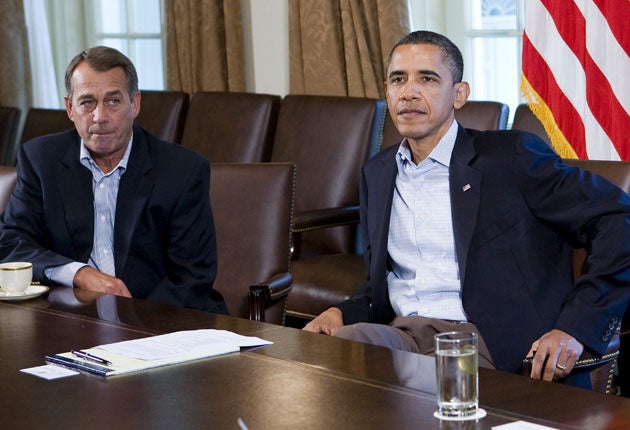Deadlock in talks to bring US economy back from the brink

The stakes are still rising in a game of political chicken that now threatens the immediate future of the global economy, as President Barack Obama continues attempts to negotiate a deal to raise the US government's debt limit.
With just over a week until a 2 August deadline that will see public coffers slip more than $14.3 trillion into the red – the maximum allowed under current rules – the White House spent yesterday trying to hammer out an agreement that will prevent the US from running out of money.
Congress has agreed to raise the debt limit more than 60 times since the Second World War, usually without serious difficulty. But the current political landscape is more polarised than ever, and any sort of consensus is proving elusive. An attempt to forge an outline agreement before the Asian markets opened last night failed.
Timothy Geithner, the Treasury Secretary, has described it as "unthinkable" that either party would let their Government run out of cash, since that would plunge the global economy, which relies on US Treasury bonds, into a state of immediate meltdown.
However, Mr Geithner was unable to report any specific progress towards an agreement. His colleague, White House Chief of Staff Bill Daley, warned that there would be "a few stressful days" ahead for markets. Both the Democrats and Republicans would like an extension of the debt ceiling tied to a plan to shore up public finances. But they are divided along partisan lines as to how to achieve that goal.
Republicans, led in negotiations by House and Senate leaders, John Boehner and Mitch McConnell, are fiercely opposed to any tax rises, and would like to sign off on only a short-term increase in debt limits that will need to be further extended in the New Year.
Democrats, represented by Harry Reid and Nancy Pelosi, are meanwhile hostile to cuts in government spending, and want a deal that will give the Government financial room to manoeuvre until after next November's election.
Mr Obama is attempting to draw a compromise between the two sides by endorsing what he calls an "extraordinarily fair" package that would see roughly $3 trillion in cuts, combined with a tax increase worth just under $1 trillion. But so far, weeks of talks have come to naught. On Saturday, the White House urged both parties to "refrain from playing reckless political games with our economy".
The US last balanced its books under Bill Clinton. But its debt began to grow dramatically under George W Bush, who passed sweeping tax cuts, particularly for the wealthy, while embarking on two expensive wars. During his reign, the defect increased by more than 20 per cent, a higher figure than for any previous president.
The trend has continued under Obama. And while the public is now reluctant to see cuts to popular (and expensive) Medicare and Social Security programs, polls suggest they are also unwilling to pay more taxes.
Ironically, given the parameters of the debate, federal taxes are at their lowest rate in modern history, at 14 per cent of GUP, while the share of revenues contributed by US corporations has never been smaller.
Join our commenting forum
Join thought-provoking conversations, follow other Independent readers and see their replies
Comments
Bookmark popover
Removed from bookmarks